Is Happy Birthday to you Used A lot?
Arguably among the most widely used words in any language are, “Happy Birthday.” And, probably the most famous and commonly used lyrics are those from the song, “Happy Birthday to you.” It’s played repeatedly by millions of people. They sing it in their homes. They sing it in their cars. People sing Happy Birthday to you in restaurants and on the job. Amateur and professional bands alike play the song. And television shows and movie executives incorporate it into programming on a consistent basis. I suspect that someone is singing as I write this post.
Everybody knows the lyrics to the song Happy Birthday to you. What everyone doesn’t know is that until a few years ago, the song was arguably still protected by copyright. At least that is what renowned music publisher, Warner/Chappell Music Inc. (“Warner/Chappell”) had everyone believe. That was evidenced by the astronomical license fees it charged (and received) as it continually claimed copyright ownership. But as was later determined, Warner/Chappell no longer has ownership rights to the lyrics in the song.
The Happy Birthday to you Lawsuit.
In 2013, Good Morning To You Productions (the “Company”) filed a lawsuit against Warner/Chappell. The Company was making a documentary about the song, Happy Birthday to you, when it received a demand for licensing fees. The Company challenged Warner/Chappell’s copyright ownership. They argued that while the original copyright may have been received in 1935, the term ended in 1963. Further, that there was no record of the song being renewed, therefore it fell into the public domain.
Who Owns the Lyrics?
It is unclear as to the true original owners of the songs. But in piecing together history and from lawsuits, here is what appears to be close to the truth. Some of the lyrics emerged in 1901, but the complete version of the lyrics appeared in print in 1911. Sisters Patti Smith Hill and Mildred J. Hill claimed to have written the melody in 1893, however, their lyrics were different. Subsequently, they conveyed their rights to publisher Clayton F. Summy, who published the song in a book titled “Song Stories for the Kindergarten.” In 1930, Patti Smith Hill claimed she had ownership rights back in 1901 to the lyrics to “Happy Birthday to You,” when she co-wrote “Good Morning to All.”
In ruling for the Company, the court determined that Clayton F. Summy only had the copyright to the limited piano arrangements of the song’s melody and not the lyrics. For that reason Summy never acquired the rights to the Happy Birthday lyrics, therefore their purported successors-in-interest do not own a valid copyright in the Happy Birthday lyrics.”
The Real Winners.
Arguably, the biggest winners in the case were the movie studios and filmmakers, because they got out from under the licensing arm of Warner/Chappell.
I’m Attorney Francine Ward.

Francine D. Ward
Attorney-At-Law, Author, Speaker
Follow Francine:
Don’t miss Francine’s Latest Blogs:
- Sweepstakes ScamsSweepstakes Scams. The Federal Trade Commission (FTC) has settled with several operators of a sweepstakes scam. The scam bilked consumers out of millions of dollars. Included in the settlement agreement,… Read more: Sweepstakes Scams
- Incapacity PlanningIncapacity Planning. Incapacity is an unexpected wrinkle in your estate plan. I am a planner. I make plans, I like making plans, and sometimes my plans go awry. Despite any… Read more: Incapacity Planning
- Publishing contractsPublishing contracts The publishing contract is an agreement that defines the relationship between an author and her publisher. Publishing contracts typically contain elements that speak to territory, rights, ownership, financial… Read more: Publishing contracts
- What is a Habit?As we enter springtime, you may feel far away from your New Year’s resolution. That may be because of the success rate of NYE resolutions. In fact, January 17 is… Read more: What is a Habit?
- Common Contract MistakeCommon Contract Mistake #1. Not Having Written Agreements with EVERYONE You Do Business With. Common contract mistake. Without question, the most common contract mistake is not having the terms of… Read more: Common Contract Mistake











